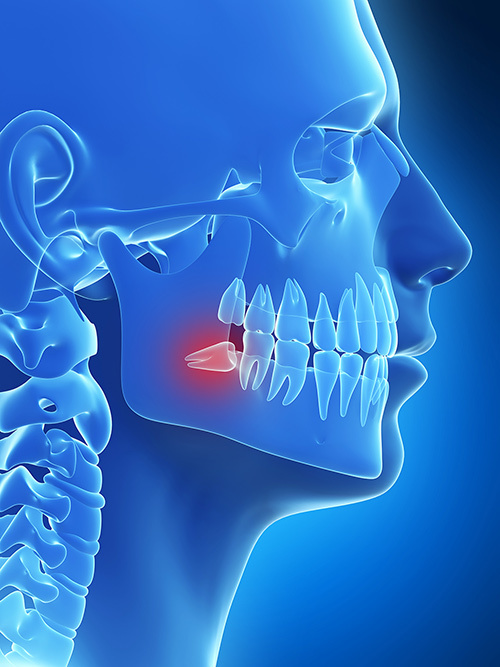Dental Experts
Wiki Article
Exploring Different Sedation Options for a Comfortable Wisdom Teeth Extraction Experience
:max_bytes(150000):strip_icc()/how-are-wisdom-teeth-removed-1059378_FINAL-8a3c2fc6c2c4488499a5c0a25ce7af95.png)
Regional Anesthetic
Local anesthesia is a commonly used method for numbing certain areas of the mouth throughout knowledge teeth extraction treatments. By administering a regional anesthetic, such as lidocaine, a dental practitioner can make certain that the person continues to be comfy and pain-free throughout the extraction process.
One of the key benefits of regional anesthesia is its targeted numbing result, which implies that only the specific location being treated is affected. This localized approach decreases the risk of systemic negative effects and enables a quicker recuperation post-procedure. wisdom teeth removal aspendale. Additionally, local anesthesia is taken into consideration to be a safe and regular technique in dentistry, with minimal dangers involved when administered by a trained expert
Nitrous Oxide

In addition, nitrous oxide is recognized for its rapid healing time. When the mask is eliminated, the results of the gas subside rapidly, enabling patients to resume their normal activities without sticking around sedative impacts. This makes nitrous oxide a convenient option for those who require to drive themselves home after the dental appointment. Nitrous oxide is suitable for people of all ages, making it a flexible sedation option for knowledge teeth extractions and other dental treatments.
Oral Sedation

Among the main advantages of oral sedation is its simplicity of administration. Unlike intravenous sedation, dental sedation does not call for shots or needles, making it an extra comfortable option for people with an anxiety of needles. In addition, oral sedation is thought about secure and effective when administered by trained dental specialists. It is crucial for people to comply with pre-operative guidelines supplied by their dental professional, such as avoiding from consuming alcohol or eating prior to the procedure to make certain the sedative medication functions as intended.
IV Sedation
Carried out intravenously by experienced clinical specialists, IV sedation is a powerful technique made use of to cause a controlled state of deep relaxation and unfamiliarity throughout oral treatments. Unlike dental sedation, which can be unforeseeable in its impacts, IV sedation enables specific control over the level of sedation, making it a perfect selection for complex procedures like knowledge teeth extractions.Throughout IV sedation, a sedative medicine is supplied straight right into the blood stream via a capillary, permitting it to work swiftly and successfully. This technique makes certain that the client continues to be uninformed and comfortable of the treatment while still keeping important functions such as breathing and heart price.
One of the key advantages of IV imp source sedation is its capacity to provide a much deeper degree of sedation contrasted to various other techniques, making it specifically appropriate for people with high degrees of anxiousness or those going through considerable dental job. Furthermore, the impacts of IV sedation typically wear off progressively after the treatment, lowering the probability of grogginess or remaining side impacts. Generally, IV sedation offers a risk-free and effective option for ensuring a comfy and worry-free experience throughout wisdom teeth extraction.
General Anesthesia
Having actually gone over the benefits of IV sedation for wisdom teeth removal, the use of general anesthetic supplies an alternative choice for individuals requiring a much deeper degree of unconsciousness throughout dental procedures. General anesthetic induces a regulated state of unconsciousness, ensuring the person feels no discomfort or pain during the removal process. This approach is especially helpful for individuals with extreme dental anxiety, complicated surgical requirements, or those undergoing several removals simultaneously.General anesthesia is carried out by a trained anesthesiologist who carefully monitors the client's essential signs throughout the treatment. It includes using intravenous drugs or inhaled gases to cause a state of unfamiliarity. While under general anesthetic, the patient will not understand the surgical treatment, experience any discomfort, or have any type of recollection of the procedure later.
Although general anesthetic is secure when administered by certified specialists, it lugs a slightly greater threat contrasted to other sedation alternatives. wisdom teeth removal aspendale. Clients thinking about basic anesthesia for knowledge teeth extraction must discuss the prospective dangers and advantages with their dental practitioner or dental surgeon to make a notified decision based on their private demands and case history
Verdict
To conclude, different sedation choices are readily available to ensure a comfortable wisdom teeth removal experience. Local anesthesia is typically utilized for numbing the particular area, while nitrous oxide offers relaxation and pain relief. Oral sedation and IV sedation deal much deeper levels of relaxation, relying on the client's requirements. General anesthesia can be made use of for much more intricate instances. It is very important to talk to your dentist or oral surgeon to identify the most ideal sedation option for your treatment.Nitrous oxide is appropriate for people of all ages, making it a functional sedation option for wisdom teeth removals and other oral procedures.
Unlike intravenous sedation, oral sedation does not require shots or needles, making it a more comfy choice for people with a worry of needles.One of the primary advantages of IV sedation is its capability to offer a deeper degree of sedation contrasted to other methods, making it especially ideal for people with high degrees of useful content stress and anxiety or those going through extensive oral work.Having actually talked about the advantages of IV sedation for discover here knowledge teeth extraction, the utilization of basic anesthesia gives an alternative choice for individuals requiring a much deeper level of unconsciousness during oral procedures. Oral sedation and IV sedation deal deeper degrees of relaxation, depending on the person's needs.
Report this wiki page